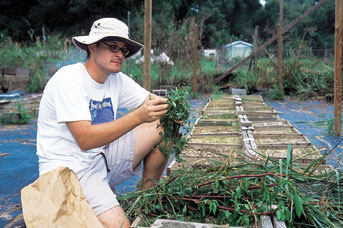

A publication of The Graduate School, University of North Carolina at Chapel Hill
Archives Spring 2002
Home | Back issues | About us | Email your feedback | The Graduate School | UNC-Chapel Hill | Make a gift

Sometimes, in spite of all of the high-tech astuteness in the West, it seems that the “less-advanced” societies may have had the right idea all along. That’s to some extent what Jason Fridley is trying to find out with his doctoral research in plant ecology.
Jason
Fridley, a Henry Dearman Dissertation Fellow in the Royster Society of
Fellows, studies how species diversity can maximize agricultural production.
This would be nothing new to family farmers in Central America, who have
historically grown fields interlaced with corn, beans and squash.
Together, the three crops comprise an ecosystem that makes full use not only of the available acreage but also of the vertical gaps that are left when only one crop covers a field.
Studies show that such diverse ecosystems thrive because each species fills an environmental niche complementary to those of other species, said Fridley. Yet, in the United States, with its huge mechanized farms, there is no machine that can harvest three different crops in a single field. “So there’s no incentive to do it,” Fridley said.
 |
| Photo by Will Owens |
| Jason Fridley harvests the results of his research at the Mason Farm Biological Reserve in Chapel Hill. |
That could change if scientists could fully understand and identify an advantage of “intercropping.” Such studies might also tell us what happens to naturally diverse ecosystems that suddenly lose one or more species — as is happening worldwide at a galloping pace with development, pollution and global warming.
Fridley, 27 and a Missouri native, has done his part for intercropping each of the last three summers at the Mason Farm Biological Reserve in Chapel Hill, near the North Carolina Botanical Gardens. There, he has planted hundreds of small communities of herbs and grasses. Each August, when other students might be at the beach, Fridley spends a hot, grueling week or two harvesting the crops, drying and weighing them to see whether the yield is increased by species diversity.
With diverse ecosystems as the biological norm, Fridley asked, “why would we assume we’re maximizing resources” with single agricultural monocultures?
His research is the direct outgrowth of a longtime interest. As an undergrad at Bennington College in Vermont, Fridley wrote his honor’s thesis about the benefits of crop diversity on weed suppression. He plans to defend his dissertation in spring 2002 — right on time, thanks to his Royster Fellowship.
Fridley received funding from
the biology department in his first year of the five-year doctoral program.
During the next three years, the National Science Foundation awarded him
a fellowship and a generous grant toward his dissertation research.
He particularly enjoys the
Royster Society because the fellows are brought together every two weeks
to talk about their research. Before he received the fellowship, with
the demands of his research and a toddler at home, Fridley said he never
had the opportunity to spend time with students from other disciplines.
“In fact, I don’t even see other students on any other floor
in this building,” Fridley said, laughing, from his fourth floor
lab in Coker Hall. Next, he is hoping for a two-year, post-doctoral fellowship
in England, where he wants to study the genetic diversity of an ancient
pastureland.
Meanwhile, Fridley and his
wife, Genevieve, a master’s student in the School of Social Work,
have traded off child care while studying and researching. Having a child
while in graduate school has “just made me a more efficient user
of my time,” said Fridley. On the days that he is home with Echo,
he has to rush to his computer the moment she starts her two- to three-hour
naps. Even so, he keeps things in perspective.
“I don’t think it’s
a wasted day when I’m at home with her,” Fridley said.
-Cindy Elmore
© 2002, The Graduate School, The University of
North Carolina at Chapel Hill
All text and images are property of The Graduate School
at the University of North Carolina-Chapel Hill. Contact Sandra Hoeflich
at shoeflic@email.unc.edu
to request permission for reproduction.
Contact Alexandra Obregon at aobregon@email.unc.edu if you have technical problems with this Web site.